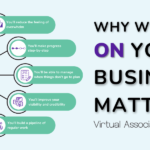If you are running a successful business, apart from it generating decent income to provide you and your family the lifestyle you want, the business itself possibly has a saleable value. This value has been built up because of the money you (and maybe other business partners) have injected into it over the years via actual savings and debt. As long as you the founder or current owner of the business is around, preserving and growing the value of your business shouldn’t be a problem. All you have to do is ensure the business remains competitive and can provide what your customers want. However, what happens if you died last night or suffered a severe illness that restricted your ability to work in the business going forward?
You may have built up a team of staff who could keep the business going for a period of time, but is the business too dependent on you and your efforts? Are the staff that work with you simply taking your directions and fulfilling simple tasks? They aren’t the decision-makers in the business or the rainmakers who go out and get new customers. If you are the main driver in the business, then you need to ensure that if the worst happened, there are contingency plans for such an event.
Risk management
Every successful business has risk management plans in place to cater for the unexpected. In my business for example, I have an alarm system monitored 24 /7 to protect against break-ins. All our client data is backed up just in case we have IT issues. We also contract a great IT services company to help us secure our data and computer systems.
Firms that hold stock would have systems in place to secure this asset against theft and fire for example. Buildings they operate from would have sprinkler systems in place. People in any business are key. So there’d be proper processes and frameworks to ensure that they were looked after from an occupational health and safety viewpoint. The law would also have to be adhered to in terms of employment conditions. All of these actions by successful businesses enable them to manage the risks they face every day. One of the key risks though is the owner of the business. What is being done to cover for the possible death or disability of this individual?
Lifestyle
Most business owners have a family. Many business families are not involved in the day to day running of the business because a spouse may choose to look after the children or he or she may have a separate career. Any children of the owner may be too young to work in the business or they may not be interested in joining the business. Yet the owner’s family may be very dependent on the income the business generates to maintain their lifestyle and fulfil their dreams. The value being built up in the business could also be important for any retirement plans the family may have. The sale of the business may generate the capital needed to fund a comfortable retirement. Schooling and university costs may also be generated from the income of the firm for the owner’s children. All this could be jeopardised if the owner could no longer work in the business or died last night.
Value maintenance
Business value is usually created by the owner and his team who are able to generate sales. It is also created through systems and processes. McDonald’s for example has a repeatable process to produce the food it sells. As long as customers buy and provide revenue, profits will drive the value of a business. How crucial is the owner in the process? The smaller the firm, the more dependent the business is on the owner. The larger the business, the more staff and systems it has, which doesn’t depend on the owner, the less reliant it is on him or her. If the owner drives sales and staff to just fulfill orders, then the owner is important to the survival of the enterprise going forward.
With the owner no longer in the business should the worst happen, the value of the business built up over the years may significantly decline or evaporate altogether. Apart from the value disappearing, the income to business generates could vanish as well. A lifetime’s effort is at risk and the welfare of the owner’s family is at stake.
How to manage the risk?
Successful business owners may have a Plan B already in place. It may involve key staff members being able to operate the business until a buyer is found or the staff themselves may buy the business. The owner may have accumulated sufficient wealth from the business over the years so that if the worst happened, the family left behind would be independently wealthy and not reliant on the sale value of the business to fund their lifestyle. However, what if this wasn’t the case. What if the business was very dependent on the owner and without the owner around its income and value would be seriously the affected? What can be done in this situation?
A plan is needed
We are all mortal. We will all die at some point. Life expectancy is increasing around the world and in most developed countries; it stretches into the late 70s or early 80s. However, unfortunately many people for a variety of reasons don’t make it to these ages. So what you do when you and your family depends on the survival of the business and owner’s ability to continue to work in it? The best planning requires a contingency plan to be put in place to cater for the unexpected.
Let’s assume the owner’s independent wealth isn’t large enough to walk away from the business’ income and sale value. It means the owner and the family must replace the income the business provides and the value the business has at the moment. If income from the business stops, personal expenses can’t be met. This has a catastrophic impact on the lifestyle of the owner and family.
The family’s wishes
It’s best to ask the family what they would like to see happen if the business could no longer operate. Working with business owners over the years no one has said to me that they don’t want to maintain the current lifestyle if they could no longer work in the business. When I ask spouses, dependents of the business and the efforts of their life partner what they’d like to see happen, they always say maintenance and continuity of their current and future lifestyle is really important.
A solution
Earlier I mentioned good businesses manage the risks well. They do so because if the worst occurred, the cost could be horrendous. For example, a fire destroying all their stock.
So what does a personal (owner) risk management strategy look like in the absence of a Plan B? It means getting someone else to buy out the business at an agreed value if the owner died yesterday or was so incapacitated that he or she couldn’t perform their normal duties. So who would buy a business for its current value if the owner died last night? Remember I said earlier an owner dependent business was not worth a lot if the owner was no longer around to an outside person or organisation. So who would buy the business? The ”buyer” would be a company that agreed to insure the life of the owner which equates to the value of the business. So let’s say the business is worth $1 million if sold today. However, this value disappears if the owner died last night and wasn’t there to sell it. So the plan would be to insure the life of the owner for $1 million and on his or her death which means $1 million would be paid out to their spouse or family. The business would have to shut down as it couldn’t be sold but it’s value is preserved and protected. So what would be the cost of such a risk management scheme? Depending on the country and the age and health of the owner it could be as little as a few dollars a day. These few dollars buys certainty for the owner and their family. What would you like to do for your family? What plans do you have in place at the moment to protect the value of your business ownership? Who do you turn to if this is an issue for you and you believe this needs to be addressed?
Specialist advice
Business is complex and the needs of every business owner and their family are unique. More importantly things change over time. What makes sense today may not apply in the future as the business changes and the family circumstances change over time. Hence if you believe you need assistance in this area you need to turn to someone who is a specialist in this field. Your accountant may be able to help. If he or she can’t, they should be able to direct you to someone who can assess your needs and offer an affordable and tailored solution that makes sense for you and your family. For Australian readers my firm Business Ownership Protection Specialists offers this service to business owners and their families. In fact, I believe this is an area of real importance that I write a book on it to raise awareness about a matter that is fundamental to every business owner and their family and yet it is not top of mind for them. The book is called “Business Ownership Bulletproofed” and is available from Amazon and the Apple iTunes Store. Our website is www.bops.com.au where a free chapter of the book can be downloaded. Our email address is info@bops.com. Our phone number in Australia is 1300 558 783. I’d be glad to answer your questions on this topic should you have any.
In the end you would protect the value of your business because you loved your family and you wanted their futures looked after.
This article is of a general nature only and neither represents nor is intended to be specific advice on any particular matter. Hillross strongly suggests that no person should act specifically on the basis of the information contained herein but should obtain appropriate professional advice based on his or her circumstances.
Daryl La’Brooy CFP, B.Bom, B.Bus (Acc.), MBA, FCPA, FFin, Certified Financial Planner is an Authorised Representative of Hillross Financial Services Ltd (ABN 77 003 323 055), AFSL 232705.







